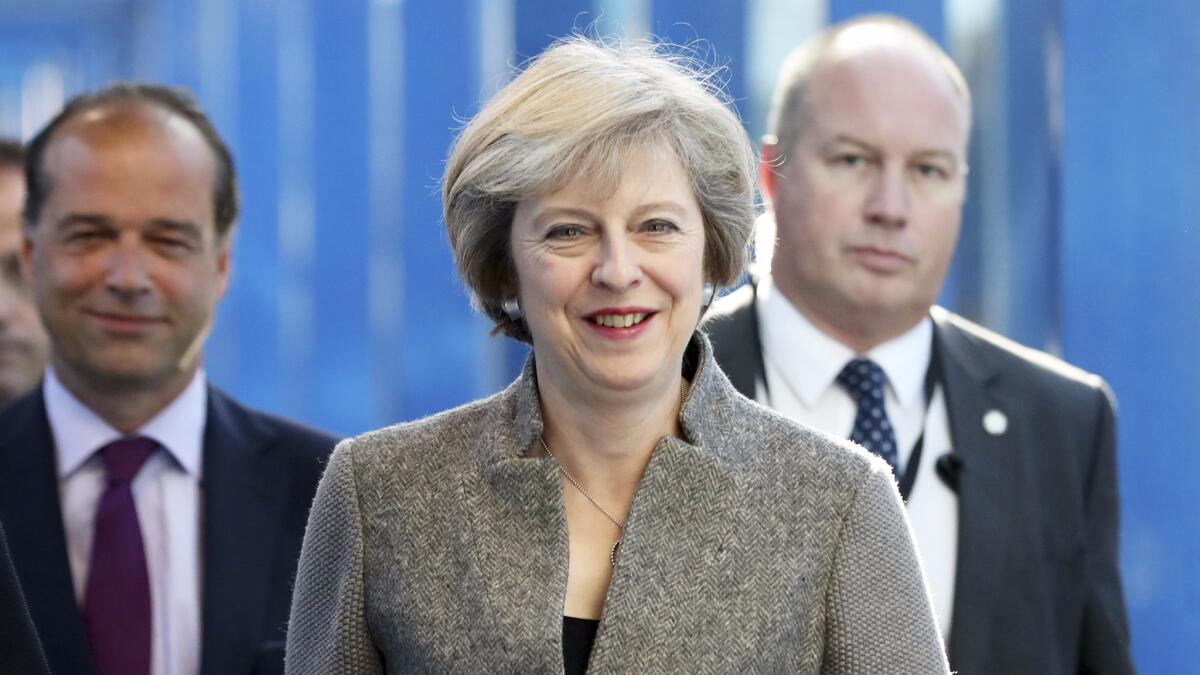Britain’s exit from European Union expected by summer 2019

Reporting from London — Shortly before becoming British prime minister in July, Theresa May declared “Brexit means Brexit.”
Voters had narrowly favored leaving the 28-nation European Union in a June referendum, and May was putting her stamp on the notion that there was no turning back.
Now she has set a timetable for a two-year process that ultimately would see Britain extricated from the EU by summer 2019.
May, during a speech at the annual Conservative Party conference in Birmingham, said Britain would invoke Article 50 of the Lisbon Treaty, which would launch proceedings by the end of March.
“Whether people like it or not, the country voted to leave the EU,” May said Sunday. “We are going to be a fully independent, sovereign country, a country that is no longer part of a political union with supranational institutions that can override national parliaments and courts.”
May had previously said that Britain would initiate the break by the end of 2017. Many observers felt she might wait until the later part of the year to give the government more time to work out a coherent exit strategy, and also possibly wait for the conclusion of the French and German elections.
But the prime minister appeared in no doubt that leaving the EU needed to happen swiftly and stated that her government “will be ready soon” to take Brexit forward.
It was a move that was welcomed by European Council president Donald Tusk, who said her declaration brought “welcome clarity.”
But divisions within the Conservative Party were also quick to emerge with pro-Remain lawmaker Anna Soubry expressing concern over the timing.
“[It] troubles me hugely,” she said on British broadcaster ITV Suffolk on Sunday. “It is going to take a lot of time and effort to disentangle ourselves and get the right deal.”
Immigration became one of the central campaign issues during the referendum campaign with then UK Independence Party leader Nigel Farage frequently touting that Britain needed to “take back control” of its borders.
Although the exact terms of Britain’s future trade and business relationship with the EU are unknown, May gave the clearest indication yet that Britain would be willing to sacrifice its free trade status within Europe to reclaim control over who it allows in.
“We are not leaving the European Union only to give up control of immigration again,” she said.
It was May’s first party conference as leader since she succeeded David Cameron, who campaigned for the Remain side in the referendum and swiftly resigned following the results. The vote, and campaign leading up to it, left deep rifts in the country, which saw the Leave side win by 52% to 48%.
More than 30 million people (71.8% of the electorate) turned out to vote. Protesters took to the streets of London in the thousands after the vote, chanting that a withdrawal from the EU was not in their name.
An online petition calling for a second referendum amassed more than 4.1 million votes. The referendum has also sparked a legal challenge, which is scheduled to be heard this month in London’s High Court, where lawyers will argue that any attempt to invoke Article 50 must only be triggered by an Act of Parliament.
During the speech Sunday, May rebuked such actions, saying they were attempts to kill Brexit by delaying it.
She also sought to quash any arguments that different parts of Britain could negotiate their own deal with the EU, a statement clearly aimed at Scotland, which voted against independence from the rest of Britain in a 2014 referendum but overwhelmingly voted to stay in the EU.
“We will negotiate as one United Kingdom and we will leave the European Union as one United Kingdom,” she said. “There is no opt-out for Brexit.”
May also announced that the Great Repeal Bill would be introduced in the Queen’s Speech next year. If passed by parliament, it would come into effect on the day that Britain formally leaves the EU and would automatically change existing EU law into British law.
May had publicly sided with Cameron and supported the Remain side during the referendum but the speech to her party sounded more like a stump speech for the pro-Leave campaign.
She spoke about sovereignty and the need for Britain to “stand tall” and “forge an ambitious and optimistic new role in the world.”
She also painted an image of a proud, bold nation with the fifth biggest economy in the world that had other countries -- including Canada, China, India and Singapore -- knocking at its door to make future free trade agreements.
“We don’t need -- as I sometimes hear people say -- to ‘punch above our weight.’ Because our weight is substantial enough already,” she said. “Let’s have confidence in ourselves to go out into the world, securing trade deals, winning contracts, generating wealth and creating jobs.”
Despite the ambitious talk, the pound nearly hit a 31-year low against the dollar as May outlined her plans.
Boyle is a special correspondent.
ALSO
Will the ‘Brexit’ mark the end of the age of globalization?
Divided over immigration, one of Britain’s most diverse cities voted for ‘Brexit’
The British establishment didn’t think ‘Brexit’ could win, but it did. Here’s why.
More to Read
Sign up for Essential California
The most important California stories and recommendations in your inbox every morning.
You may occasionally receive promotional content from the Los Angeles Times.










